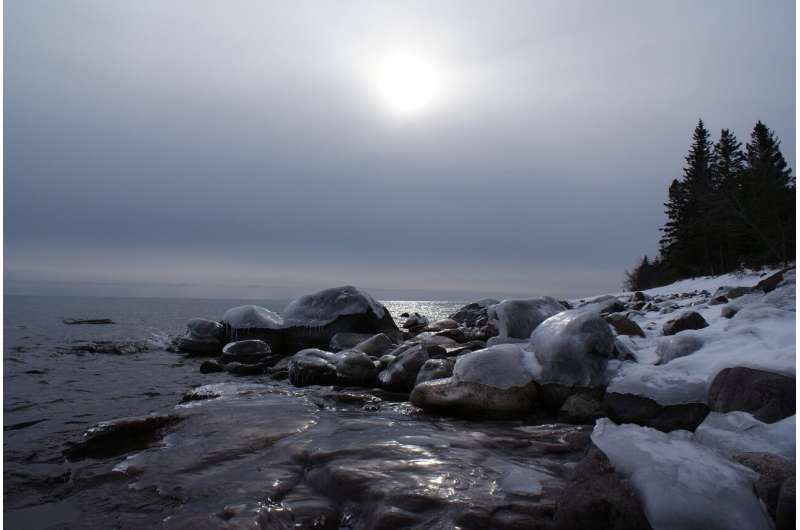Credit: CC0 Public Domain
Icy, snow-covered lakes are a normal part of Midwest winters, but Great Lakes ice cover is taking a big dip this year in Michigan and other states, weather experts say.
The National Oceanic and Atmospheric Administration's Great Lakes Environmental Research Laboratory found that as of Thursday, the Great Lakes ice cover was 17.6%.
Last year at this time, the ice cover hovered around 67%, according to the National Weather Service in Duluth, Minn.
In the winter of 2019, Michigan experienced a record-low temperature of minus-14 in late January. But this winter has seen warmer-than-usual temperatures that are in line with the advance forecasts for normal or slightly-warmer-than-usual temperatures.
Even last week, on Valentine's Day, the figure was closer to 17%, with water widely visible; typically around Feb. 14, Great Lakes ice cover, on average, is 41%, NASA's Earth Observatory said.
Why the change? Jia Wang, an ice climatologist at NOAA's Great Lakes Environmental Research Laboratory, attributed it to warmer air temperatures this season, according to Earth Observatory.
While Metro Detroit has had seasonable conditions this week, that's set to change in the coming days. After topping out in the 30s on Friday, the mercury is forecast to climb into the 40s Saturday and near 50 on Sunday, the National Weather Service said.
But the lower ice coverage is not unusual. Since 1995, the Great Lakes have four times hit low averages for the entire winter of 14.3% in 1998, 11.9% in 2002, 12.9% in 2012 and 19.4% as recently as three years ago, according to NOAA statistics.
During the same 25-year period, there were great ice cover spikes. They have ranged from 80.3% in 2003 to a record 92.5% in 2014, nearly 89% in 2015 as well as about 81% last year.
The reduced ice cover is the result of warmer lake temperatures. As of Thursday, the mean surface temperatures for Lake Superior was 33.7 degrees and 37 as the mean whole lake, according to the Great Lakes Environmental Research Center. Last year, those figures were 32.5 and 36.5, respectively.
Lake Huron: Mean surface temperature was 35.6 and mean whole was 37.9 as of Thursday. Last year, those figures were 33.9 and 36.6, respectively.
Lake Erie: Mean surface temperature was 34.2 Thursday; mean whole lake was 34.8; last year, those figures were 32 degrees for the mean surface and for the mean whole lake.
Lake Michigan: Mean surface was 37.8 degrees Thursday; mean whole lake was 40.1 degrees; last year, the mean surface was 36.4 degrees and the whole lake temperature was 39 degrees.
Lake Ontario: Mean surface was 39 degrees Thursday; mean whole lake was 40.7; last year, 37.6 degrees for the surface and 39.2 for the whole lake.
© 2020 The Detroit News
Distributed by Tribune Content Agency, LLC.






















